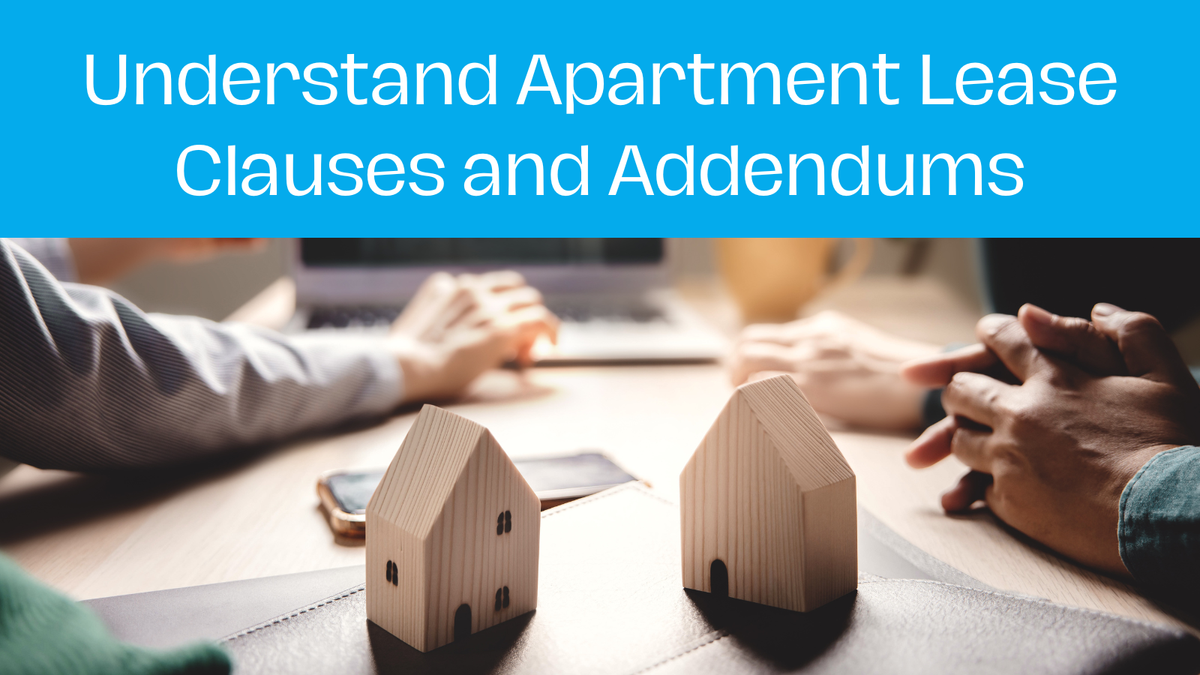Understand Apartment Lease Clauses and Addendums
The lease agreement is an important document that outlines the terms and conditions of your tenancy, so it's essential to understand its clauses before signing. We hope this guide will help you navigate the lease agreement and ensure you have a successful tenancy.

Leases can certainly be a bit of a challenge to understand and if you're not familiar with the legal jargon, it can be quite daunting. It's important to take the time to read through the entire lease and understand the terms and conditions before signing. If you're not sure about certain clauses or addendums, you can always ask your landlord, your real estate agent, or a lawyer for clarification. It's also a good idea to research your state laws so you can be fully aware of your rights and obligations. Good luck!
A lease typically contains both clauses and addendums. Clauses are provisions that are written into the lease agreement and are usually put in place to protect the rights of both the renter and the landlord by adhering to state and local landlord-tenant laws. Addendums are separate documents that are added to the lease to provide additional information that is not included in the original lease agreement. They can be used to modify, clarify, or add something to the lease agreement.
Doing research ahead of time into the standard lease clauses that could potentially be included in your lease agreement is a great idea. It's always a good idea to be familiar with the different types of clauses, such as the lease renewal clause, the subletting clause, the pet clause, the security deposit clause, and the termination clause. Knowing what these clauses mean, and how they can affect you, can help you make the right decision when signing your lease, and can help to avoid conflicts in the future.
- Subletting: Subletting is a great way for tenants to fill their rental unit if they have to move out for a short period of time. However, it's important to make sure that the tenant follows the rules and regulations of the lease agreement and informs their landlord of their intent to sublet. The landlord should also conduct a background check of the person looking to sublet the unit to make sure they are a responsible tenant. If all the necessary steps are taken, subletting can be a great way for a tenant to stay in their home and have someone help cover the rent.
- Pets: As a tenant, it is important to understand the landlord's pet policy before bringing a pet into the property. Landlords have the right to restrict the type and number of pets, as well as the fees associated with having a pet. These fees may include a pet deposit, pet fee, or pet rent. For any pet, you may also need to provide breed, weight, and vaccination records. If you have any questions or concerns, it is best to speak with the landlord beforehand.

- Landlord access to property: This agreement allows the landlord to enter the premises during reasonable hours, with appropriate notice given to the tenant. The landlord must make sure that they provide sufficient notice to the tenant, so that they can be present or arrange for someone to be present during the duration of the landlord's visit. This agreement also requires that the landlord respect the tenant's privacy and not disrupt their normal activities during the visit.
- Severability clause: The severability clause is an important part of a lease agreement. It ensures that if one part of the lease is deemed invalid by a court, the rest of the provisions will remain in effect.
- Noise: As a tenant, it is important to be mindful of your environment and be respectful of your neighbors. The landlord may be required by state or local law to enforce the noise clause and make sure you are not causing any excessive noise or engaging in activities that could potentially disturb your neighbors. Please be conscious of the noise you make and activities you engage in while on the property to ensure that you are not in violation of this clause.
- Lease termination: If you violate the terms of your lease, your landlord may terminate the lease. However, your landlord must give you written notice, which must include the reason for the termination, and a period of time to fix the violation or breach. If you do not fix the violation or breach within the given time, your landlord may terminate the lease. It is important to read the terms of your lease carefully and to be aware of all lease requirements to avoid any violations.
- Security deposit: The security deposit clause should include the amount of the deposit, how it will be held, the reasons why money may be deducted from the deposit, and how the deposit will be returned to the renter.
The lease agreement is an important document that outlines the terms and conditions of your tenancy, so it's essential to understand its clauses before signing. We hope this guide will help you navigate the lease agreement and ensure you have a successful tenancy. Be sure to read the lease carefully, ask questions if you don't understand something, and don't be afraid to negotiate if there is something you don't agree with.
Looking for an apartment to lease in Boston? Spot Easy can help.